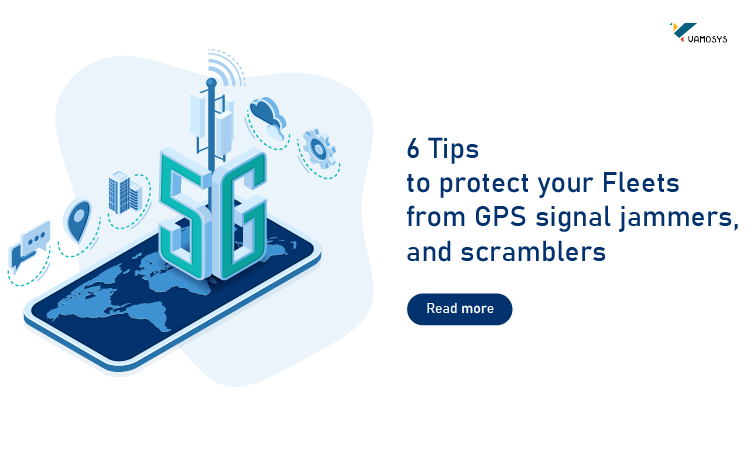6 Tips to protect your Fleets from GPS signal jammers, and scramblers
Summary
GPS signal jammers and scramblers can be used to interfere with GPS trackers used for fleet management. This can pose a security risk for fleet businesses, making it difficult for fleet management to monitor their fleets and cargo. To protect fleets from such threats, companies should implement privacy authorization, educate workers on the risks, install anti-jamming technology, use multiple tracking systems, conduct regular vehicle inspections, and monitor vehicle performance data.
As a coin has two sides, every step of advancement in the technology has its own other side too. As GPS trackers are of a huge support for the fleet management to have complete control over their fleet movements and their performances, Sometimes to avoid such monitoring, devices like GPS signal jammers and scramblers are also used in the industry for countermeasures. In this blog, you will see in detail about these devices.
GPS signal Jammers and scramblers
Before we dive deep into it, what are these devices called GPS signal jammers and scramblers?
Jammers:
Jammer is a small electronic device that transmits radio signals of the same frequency that a GPS tracker has in order to interfere with the transmissions that make the jamming of radio signals making it difficult for the receiver to get the required information.
Now what happens when a jammer is used?
A jammer interferes with the signals of a GPS tracker that is sending the live location of the vehicle through cloud servers. Such interference with the radio signals of GPS trackers by sending more radio signals of the same frequencies makes it difficult for the trackers to get the exact location of the object.
Jammers are a kind of disturbance caused in the channels with signals of the same frequencies which suppresses the signal strength at the receiver end. Use of such jammers against authorised radio communications by any private individual or an organization is a crime.
SCRAMBLERS:
Scrambler is a device that is used to encrypt the signal between one end to the other. The signal is made more private through added encryption using a scrambler that makes it difficult for the external factors to interfere with the transmission.
Now how does the receiver get the same information transmitted with the scrambler?
Receiver uses another device called de-scrambler to decode the encrypted signal to get the raw data.
So, the scramblers are the devices used to protect the raw data with encryption during the transmissions from the interference of a third party.

Do truck drivers use jamming devices?
As we know that the GPS vehicle tracking devices are used in the trucks by the fleet management team to have a better control over the fleets during the fleet operations.
Global Positioning System (GPS) is the guard of the logistics industry that prevents the loss, misuse and theft of corgos through continuous monitoring.
Despite such high tech securities through regular monitoring, there might be loss of goods and theft happening without any clue for the management and that can happen only by two ways, either the GPS tracker from the vehicle must have been removed or it is the use of GPS signal jammers to counter the tracking of fleets.
With the increase in security through technology, thieves also update their technology through such devices of intentional interference with radio signals. Accessibility of such jammers by private individuals and organizations is the issue now. Earlier it was only available and used by the government.
Increase in technology and availability of these jammers for commercial and private use is a threat for the logistics industry that enables the thieves to misuse the goods.
Drivers can be easily threatened to remove the GPS devices from the vehicle or they can be forced directly or indirectly to use the signal jammers to block the vehicle monitoring.
What is the impact on fleet business ?
Jammers have a huge impact on fleet business as it is directly related to the security of the cargo. If the GPS tracking devices are removed or the signals are interrupted at the receiving end through signal jammers, fleet management through vehicle tracking is not possible.
If the vehicle monitoring and other GPS tracking techniques become inefficient, then the fleet management becomes clueless about the current status of the fleets and its performances which ultimately makes the company vulnerable to thieves and other insecurities.
Reliability of the clients over the fleet business decreases if there is no assurance for the goods security.
6 ways to guard your fleets
1.Privacy Authorization
Any company that is functioning in the logistics industry by possessing the information of its workers and other business related information, is legally supposed to safeguard the privacy of the data. There is various information associated with a person like, name, date of birth, history of work, bank account details, etc.
Apart from the personal information of employees, it’s also important for the management to ensure the privacy of its business related information like type and quantity of goods carried in which fleet is also important information that can be easily targeted.
Such business related information must be shared only with the authorized people like customs officers during the shipment, police for clearances. During the fleet operations, wherever authorization is needed, the company or the organization must e-verify the company vehicle and the person driving the company’s vehicle for a secured operation.
In this digital world, every process has turned out to be in digital form through applications and websites. Such applications and websites of a company have the complete data which cannot be shared with any public person. This information is highly sensitive that can be accessed only by the authorized person. Such privacy authorization must be implemented in every aspect of the business for highly secured operations.
2.Education/Awareness of Risks
Being aware of the risk factors involved in the high tech world is a key factor to avoid any loss. Workers must be educated with everything about the kind of technology implemented. They must be in a position to understand its functions and also the malfunctions to alert the management immediately in case of any abnormalities.
Employees must be upgraded with the advancements to go hand in hand. Lack of update will result in confusions and carelessness which might cause major losses for the company in various aspects.
Drivers must be careful when the vehicle is not under operation. They must be parked only in the authorized areas with enough security where there is enough light around the vehicle. For that, drivers must be aware of the authorized areas and must know how to get the clearances.
Drivers should have proper documentation and enough knowledge about the documents to get clearances at appropriate places. Lack of knowledge on work, technology, company policies, governmental policies, applications being used is a big threat for the company. Every individual must be educated, encouraged and made clear with every aspect of the business operations.
3.Active Monitoring
The management team should be aware of the technical risks involved when the usage and dependency on electronic devices has increased. As GPS tracking is an active method of monitoring the fleets, the intelligent team of fleet management should also be ready with the process of detecting the unwanted signals and interferences in the channel which can disturb the monitoring.
Management and the trucks should be equipped with alternative methods to alert each other in case of any abnormalities like interference of radio signals, missing GPS tracking devices in the vehicle, malfunctioning of the device, etc.
Monitoring the locations of the fleets through GPS is not the only objective of the management, it is also being aware of the risks involved and taking appropriate counter measures to ensure safe and secured fleet operations, which is called active monitoring.
4.Driver Training
Drivers are the most important people of the logistics industry as they are the prime executors of any operations. Drivers are the ones who are directly connected to the cargos being transported.
As there are a lot of risks involved during the fleet operations, drivers must be prepared by creating awareness about the types of risks involved and their ways to tackle the risks.
Before any driver is put into fleet operations, the management is responsible for the complete training process that involves educating the driver about the various aspects of fleet operations.
Several tests must be conducted to analyse the efficiency of the drivers, based on their efficiency, the fleet operations must be allotted.Higher the efficiency on the basis of their knowledge, communication, driving and other skills, they can be alloted for the operations of high value corgos.
The fleets must be equipped with panic buttons to pass alert messages to the management in case of any emergencies during the fleet operations. Fleet management must be in touch with the driver at regular intervals for better understanding on the status of the driver and the fleet.
In such active monitoring, panic buttons will be of great use to avoid major loss for the company by taking immediate actions required for any problem faced by the driver and the fleet during the fleet operations.
5.Regular software upgrades
As there are so many electronic devices involved in the fleets, every electronic device functions on two major factors called hardwares and the softwares. Regular upgradation of the softwares ensures smooth functioning of the applications.
If the software is not upgraded on a regular basis, the functioning of applications might be abnormal or it might even stop functioning due to lack of upgradation. In case of any malfunction in the hardwares, the company cannot replace the new hardware with the same old software.
Inorder to replace new hardwares, softwares must be updated regularly to support its functionality as softwares and hardwares go hand in hand. Upgradation of softwares and hardwares on a regular basis is a key factor for a secured operation by avoiding the cyber attacks or any other form penetrations that can harm the fleet operations.
6.Multi Layered security
Having security is a general requirement of any business. But having multi layered security is the intelligence of the team of management to run the business more efficiently.
During fleet monitoring through GPS, management should make a geo-fence system around the routes that are planned by the management for the movement of the fleet from its source point to its destinations. In case of any deviations from the pre-planned routes, the geo-fencing will help to alert the management to guide back the driver on track.
If the jammers are used by the driver or thieves to block the GPS signals, an alternate GPS antenna must be used on the trucks and the trailers for higher security. One can even be used as a dummy or decoy.
GPS monitoring systems can also be curious of detecting the unwanted signals and the interferences caused by the jammers. In such cases, the management can alert the driver to be safe.
These alternative plans and actions along with the available security measures enhance the reliability and security of the fleets business.
Sushanthi
Sushanthi is a Content Writer who wishes to be the voice of brands to project their innovative ideas and stories through her writing skills.

